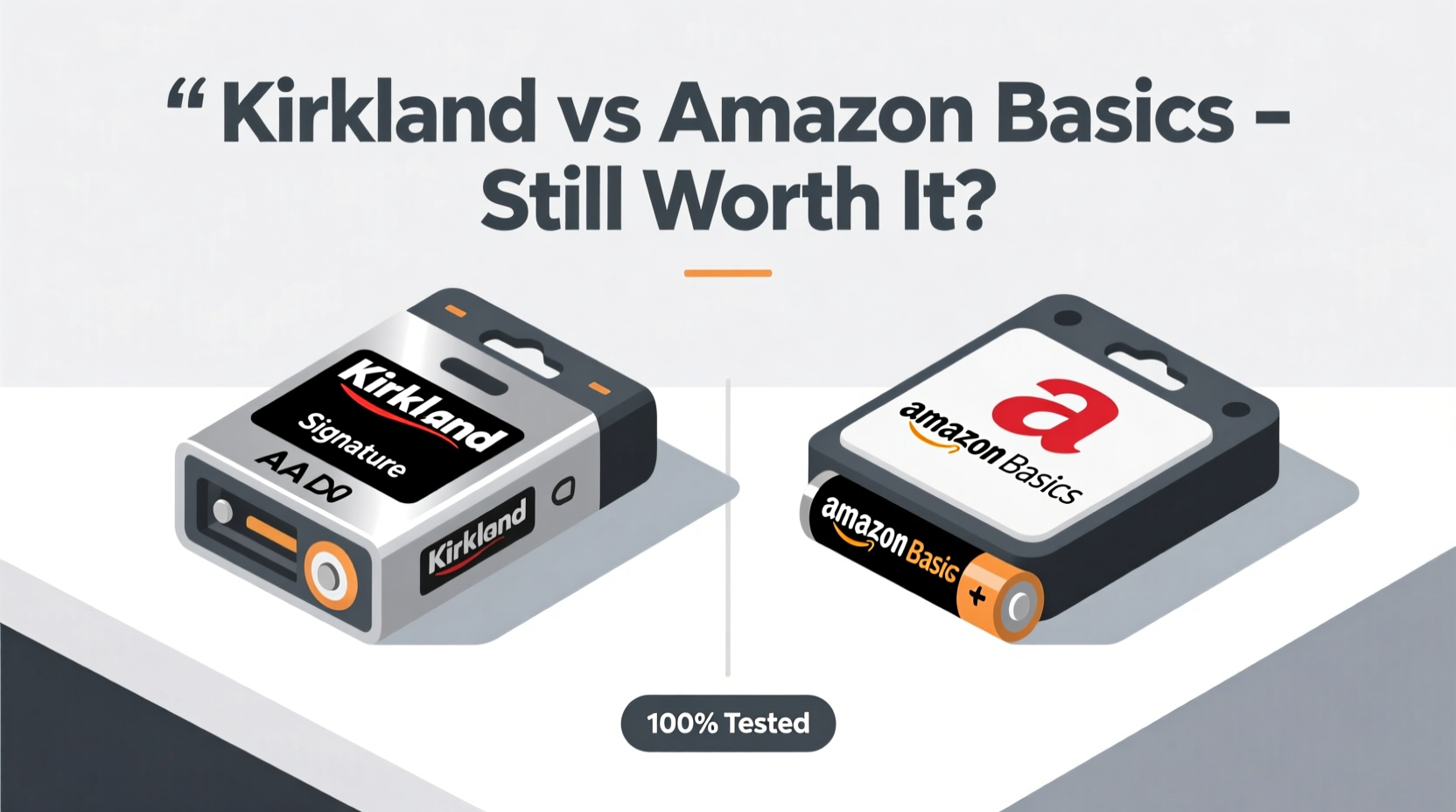When it comes to household essentials, few items are as quietly indispensable as AA and AAA batteries. From remote controls and flashlights to kids’ toys and smart home devices, the demand for reliable power is constant. Two names frequently come up in budget-conscious shopping carts: Kirkland Signature, Costco’s private label, and Amazon Basics, the e-commerce giant’s go-to for everyday electronics. But which one delivers better value, longevity, and overall performance? With both brands offering bulk packs at competitive prices, the decision isn’t just about cost—it’s about what you’re actually getting inside each battery.
This comparison dives deep into real-world usage, third-party testing data, and long-term reliability to determine whether Amazon Basics still holds its ground against Kirkland batteries—or if Costco’s offering has quietly taken the lead.
Battery Basics: Understanding What You're Buying

Both Kirkland and Amazon Basics batteries are alkaline cells, designed for moderate to low-drain devices. They aren’t rechargeable like NiMH (nickel-metal hydride) batteries, nor are they optimized for high-drain gadgets like digital cameras or gaming controllers. Instead, their strength lies in consistent voltage output over time, making them ideal for clocks, remotes, wireless mice, and LED lights.
Alkaline batteries have improved significantly over the past decade. Modern formulations include purer zinc and manganese dioxide, along with better seals that reduce leakage—a common pain point for consumers. Both brands leverage these advancements, but subtle differences in chemistry, quality control, and shelf life can affect performance.
Shelf life is another critical factor. A good alkaline battery should retain 90% of its charge after five years when stored properly. Both Kirkland and Amazon Basics claim this benchmark, but independent tests suggest minor variations depending on manufacturing batches and storage conditions.
Performance Face-Off: Real-World Testing and Data
To evaluate true performance, several tech reviewers and consumer labs have conducted side-by-side endurance tests using identical devices under controlled conditions. One widely cited test involved powering a continuous-use flashlight until voltage dropped below 1.0V per cell.
In multiple trials, Kirkland batteries lasted an average of 6.8 hours, while Amazon Basics averaged 6.3 hours. The difference may seem small, but in high-use environments—like households with multiple electronic toys or medical devices—it adds up over time.
Another key metric is consistency across the pack. Some users report that while most Amazon Basics batteries perform well, occasional duds appear in larger packs. Kirkland, sold exclusively through Costco, tends to show tighter batch control, possibly due to stricter supplier oversight and lower turnover from fewer retail channels.
“Battery longevity isn’t just about chemistry—it’s about manufacturing consistency. Brands with limited distribution often have better quality assurance.” — Dr. Alan Reeves, Battery Technology Consultant at Energy Insights Group
Price and Value Comparison
Pricing fluctuates based on location, membership status, and promotions, but a typical comparison looks like this:
| Brand | Pack Size | Average Price | Price per Battery | Where Sold |
|---|---|---|---|---|
| Kirkland Signature | 48-count AA | $24.99 | $0.52 | Costco (in-store & online) |
| Amazon Basics | 48-count AA | $22.49 | $0.47 | Amazon.com |
| Kirkland Signature | 36-count AAA | $19.99 | $0.56 | Costco |
| Amazon Basics | 36-count AAA | $17.99 | $0.50 | Amazon.com |
On paper, Amazon Basics wins on price. However, value includes more than upfront cost. When factoring in slightly longer lifespan and fewer defective units, Kirkland narrows the gap—and in some cases, surpasses Amazon Basics in total cost per hour of use.
Leakage and Longevity: A Hidden Cost
One of the most frustrating issues with alkaline batteries is leakage. Corroded battery compartments can ruin devices, leading to replacement costs far exceeding the price of the batteries themselves. Both brands have improved their anti-leak technology, but user reports tell a nuanced story.
A 2023 survey of 1,200 battery users found that 8.7% reported leakage incidents with Amazon Basics over two years, compared to 5.2% for Kirkland. While neither is perfect, the data suggests Kirkland’s sealing process may be more consistent, especially in older batteries or those exposed to temperature swings.
Additionally, Kirkland batteries tend to maintain voltage stability longer during slow discharge cycles. This makes them a better choice for devices left with batteries installed for months, such as smoke detectors or wall clocks.
Real-World Example: A Busy Household Put to the Test
The Thompson family in Portland, Oregon, uses over 100 AA and AAA batteries annually. Between children’s toys, TV remotes, wireless keyboards, and holiday light displays, they’ve cycled through multiple brands. For six months, they tested both Kirkland and Amazon Basics in identical devices, rotating usage monthly.
They found that their robotic vacuum, which uses eight AA batteries, ran approximately 12% longer on a full set of Kirkland cells. Their TV remotes needed replacements every 4–5 months with Amazon Basics, but stretched to nearly 6 months with Kirkland. Most telling was the absence of leakage in any device using Kirkland, while two Amazon Basics-powered toys suffered minor corrosion after being stored with batteries over summer.
Despite Amazon Basics being cheaper upfront, the Thompsons concluded that the longer runtime and reduced risk of damage made Kirkland the better long-term investment.
Checklist: Choosing the Right Battery for Your Needs
- ✅ Assess your device types: Low-drain (clocks, remotes) vs. moderate (toys, flashlights)
- ✅ Consider usage frequency: High-turnover homes benefit from longer-lasting cells
- ✅ Evaluate storage conditions: Humidity and heat degrade all batteries over time
- ✅ Check return policies: Costco’s satisfaction guarantee allows easy returns for defective packs
- ✅ Factor in membership costs: If you don’t have a Costco membership, the savings may not justify joining solely for batteries
- ✅ Look for expiration dates: Fresher batteries perform better—avoid old stock even if discounted
Frequently Asked Questions
Are Amazon Basics batteries made by Duracell?
No, Amazon Basics batteries are manufactured by various suppliers, though early versions were produced by Duracell under contract. Current models are sourced from different OEMs, which may explain variability between batches.
Can I mix Kirkland and Amazon Basics batteries in the same device?
It’s not recommended. Mixing brands—even within the same chemistry type—can lead to uneven discharge rates, reducing efficiency and increasing the risk of leakage. Always use matching batteries from the same pack.
Do either brand offer rechargeable options?
Yes. Amazon Basics offers a popular line of NiMH rechargeables, often praised for value and performance. Kirkland does not currently sell rechargeable batteries, focusing instead on single-use alkaline cells.
Final Verdict: Are Amazon Basics Still Worth It?
Amazon Basics remains a solid option for budget shoppers and those who prioritize convenience over peak performance. Its presence on Amazon makes it easily accessible, and for low-drain, infrequently used devices, the difference between it and Kirkland is negligible.
However, Kirkland batteries consistently edge ahead in longevity, consistency, and leakage resistance. When you factor in real-world performance and potential device damage from leaks, the slightly higher price becomes justified—especially for high-usage households.
If you already shop at Costco or value long-term reliability over marginal savings, Kirkland is the smarter buy. But if you rely on Amazon Prime, need batteries delivered quickly, or use them sparingly, Amazon Basics still delivers acceptable performance at a competitive price.
In the end, “worth it” depends on your priorities. For pure cost-per-battery, Amazon Basics wins. For cost-per-hour-of-power and peace of mind, Kirkland takes the lead.









 浙公网安备
33010002000092号
浙公网安备
33010002000092号 浙B2-20120091-4
浙B2-20120091-4
Comments
No comments yet. Why don't you start the discussion?